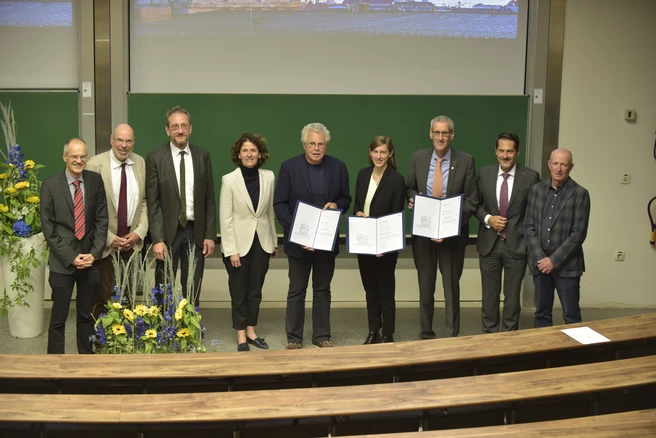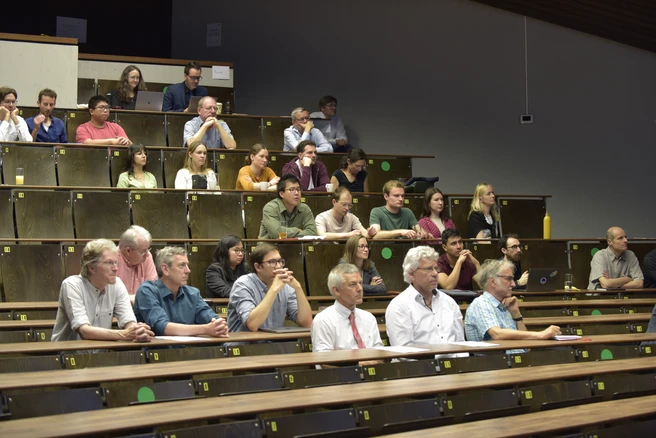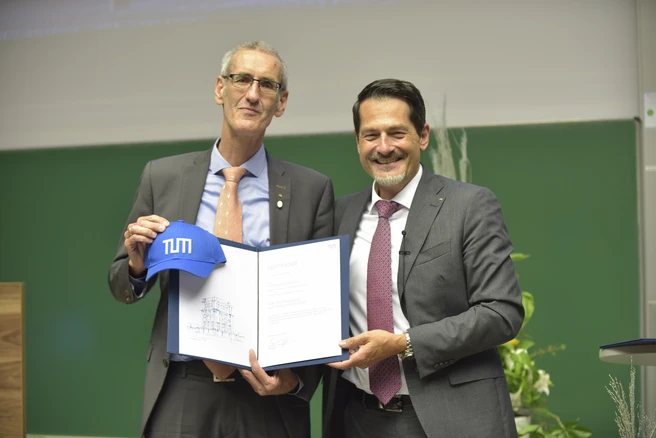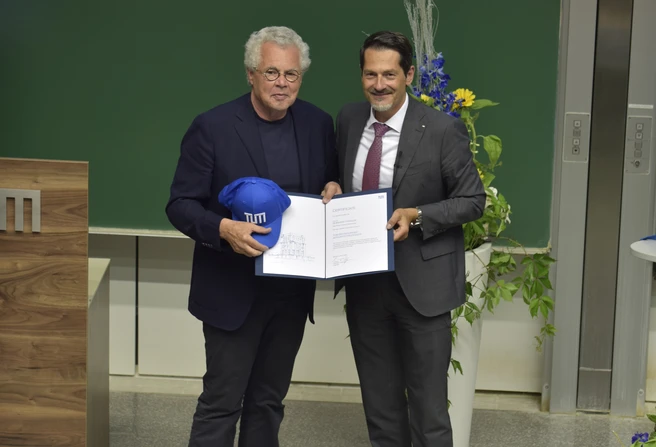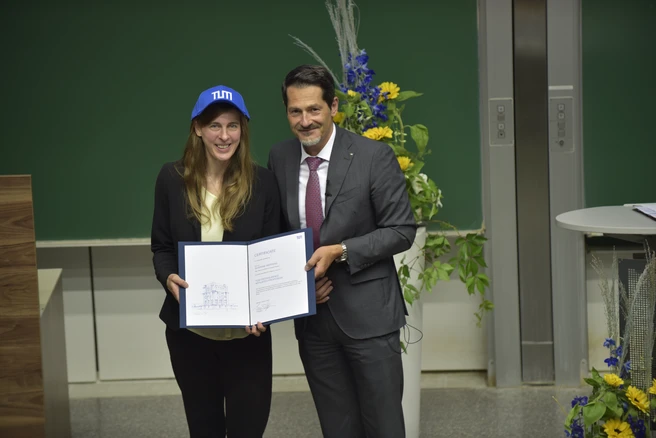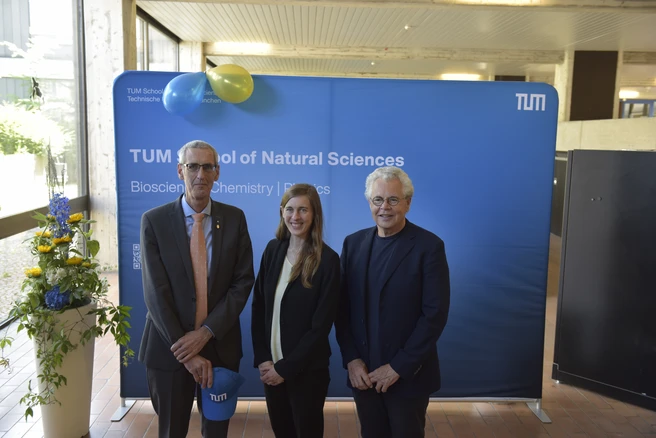On Friday, June 6, 2025, three outstanding scientists were awarded the TUM Distinguished Affiliated Professorship (DAP) in Lecture Hall 2 of the Department of Physics at the Technical University of Munich (TUM): Prof. Frank Eisenhauer, Prof. Reinhard Fässler, and Prof. Susanne Mertens. This distinction recognizes their excellent scientific achievements as well as their strong ties to TUM and its Clusters of Excellence.
The ceremony began at 11:00 with a welcome coffee, followed by an opening address by Prof. Johannes Barth, Dean of the TUM School of Natural Sciences. He welcomed the honorees and emphasized their important roles within the Max Planck Society and TUM’s Clusters of Excellence. He then handed over to Prof.Elisa Resconi, Head of the Department of Physics, who especially thanked the students for their strong attendance and Karin Lichtnecker for organizing the event.
Tributes to the New Distinguished Affiliated Professors
The tributes to the honorees followed. First, Prof. Stephan Paul honored Prof. Eisenhauer, Director at the Max Planck Institute for Extraterrestrial Physics (MPE), who has revolutionized astrophysical observation through adaptive optics and interferometry — particularly with the instruments GRAVITY and SINFONI at the Very Large Telescope. According to Paul, Eisenhauer is someone who “made the immeasurable measurable.” A recipient of the Stern-Gerlach Medal and the Gruber Prize in Cosmology, Eisenhauer is considered one of the world’s leading experimental astrophysicists.
Next, Prof. Matthias Rief, Head of the Department of Bioscience, paid tribute to Prof. Fässler, Director at the Max Planck Institute of Biochemistry in Martinsried. Fässler is internationally recognized as a leading cell biologist, known for his pioneering work on integrins — mechanosensitive cell surface receptors that mediate communication between cells and their environment. Rief highlighted Fässler’s bold career path: from practicing medicine — including time in Zimbabwe — to becoming a molecular biologist at MIT. His contributions to understanding cell adhesion, immunity, and signal transduction are regarded as groundbreaking. Particularly pleasing, Rief noted, is Fässler’s close scientific collaboration with TUM colleagues, such as Prof. Michael Sattler and Prof. Andreas Bausch.
The third tribute was delivered by Prof. Allen Caldwell for Prof. Mertens, Director at the Max Planck Institute for Nuclear Physics (MPIK) in Heidelberg. Mertens has dedicated her career to unraveling the mystery of neutrinos — perhaps the most enigmatic particles in the universe. As co-spokesperson of the KATRIN experiment and a leading scientist in the international LEGEND project, she explores not only the absolute mass of neutrinos, but also potential new particles such as sterile neutrinos, which could provide clues to the nature of dark matter. Her outstanding teaching — recognized multiple times with the “Golden Chalk” award at the TUM School of Natural Sciences — and her talent for science communication complete her impressive profile.
Official Appointment and Future Outlook
TUM President Prof. Thomas F. Hofmann officially presented the certificates to the professors following a short speech. In his address, he emphasized:
“Today’s appointments are not intended to be merely formal affiliations, but to actively promote integration into TUM’s research and teaching.” The distinction allows the awardees to supervise doctoral candidates at TUM, contribute to the TUM Institute for Advanced Study, and thereby sustainably support the development of research at TUM.
Scientific Lectures at the Highest Level
Following the ceremony, the awardees presented their current research in three engaging academic lectures:
Prof. Dr. Frank Eisenhauer – Astrophysics at Highest Resolution
Eisenhauer provided fascinating insights into his work in high-resolution astronomy. Through the use of adaptive optics, laser guide stars, and interferometric techniques, his team succeeded in measuring black holes, confirming Einstein’s predictions. The GRAVITY instrument at the Very Large Telescope interferometer achieves a resolution equivalent to measuring a millimeter at a distance of 100 kilometers — a revolutionary technology that has transformed our understanding of the universe.
Prof. Dr. Reinhard Fässler – Molecular Mechanisms of Cell Adhesion
In his lecture entitled “Molecular mechanisms of cell adhesion,” Fässler focused on the highly dynamic processes of cell adhesion during migration and cell division. He vividly described how adhesion plaques form at the leading edge of migrating cells to facilitate forward movement and disassemble at the rear to release the cell’s “anchors.”
During cell division, cells detach from the extracellular matrix and round up — a precisely coordinated shape change that allows the mitotic spindle to align properly. Here, Kindlins — a family of intracellular proteins identified in Fässler’s lab — play a critical role: both in the formation of adhesion complexes and in spindle positioning. This exemplifies the versatility and importance of molecular mechanisms in fundamental cellular processes.
Prof. Dr. Susanne Mertens – Neutrinos – Keys to the Universe
Mertens’ lecture took the audience on a journey into some of cosmology’s most fundamental questions. Neutrinos, elusive and nearly massless, could hold the answers to major mysteries in physics: What is our universe made of? Why do we exist? The KATRIN experiment recently set a new world record for the upper limit of neutrino mass—thanks to innovative AI-supported data analysis (in collaboration with the ORIGINS Cluster). In the future, new technologies, such as quantum sensors and silicon drift detectors, are expected to yield even deeper insights. She expressed her gratitude for the collaboration, especially within Collaborative Research Center Neutrinos and Dark Matter in Astro- and Particle Physics (SFB 1258).
After the final lecture, Prof. Resconi closed the event with a word of thanks to all participants. A celebratory reception at 14:15 provided guests with the opportunity to network and engage in conversation with the newly appointed Distinguished Affiliated Professors.
Further Information and Links
- TUM Distinguished Affiliated Professors: Since 2007, the Technical University of Munich has awarded the honorary title “TUM Distinguished Affiliated Professor” to internationally outstanding scientists who are leaders in their fields and maintain long-term collaborations with their peers at TUM. The title is conferred by the TUM President based on a resolution by the Extended University Executive Board and the TUM Senate. TUM Distinguished Affiliated Professors become members of the faculty of the TUM School that nominated them.
- Prof. Susanne Mertens, Max Planck Institute for Nuclear Physics
- Prof. Frank Eisenhauer, Max Planck Institute for Extraterrestrial Physics
- Prof. Reinhard Fässler, Max Planck Institute of Biochemistry
- TUM Institute for Advanced Study (IAS)
- Cluster of Excellence ORIGINS
- CRC 1258: Neutrinos and Dark Matter in Astro- and Particle Physics
Press contact
